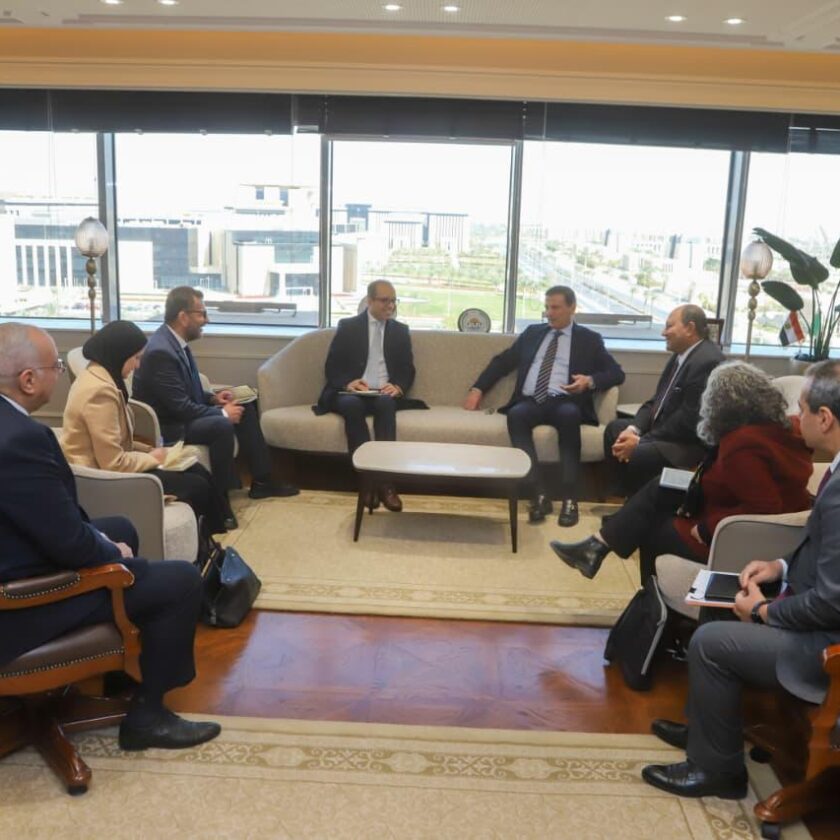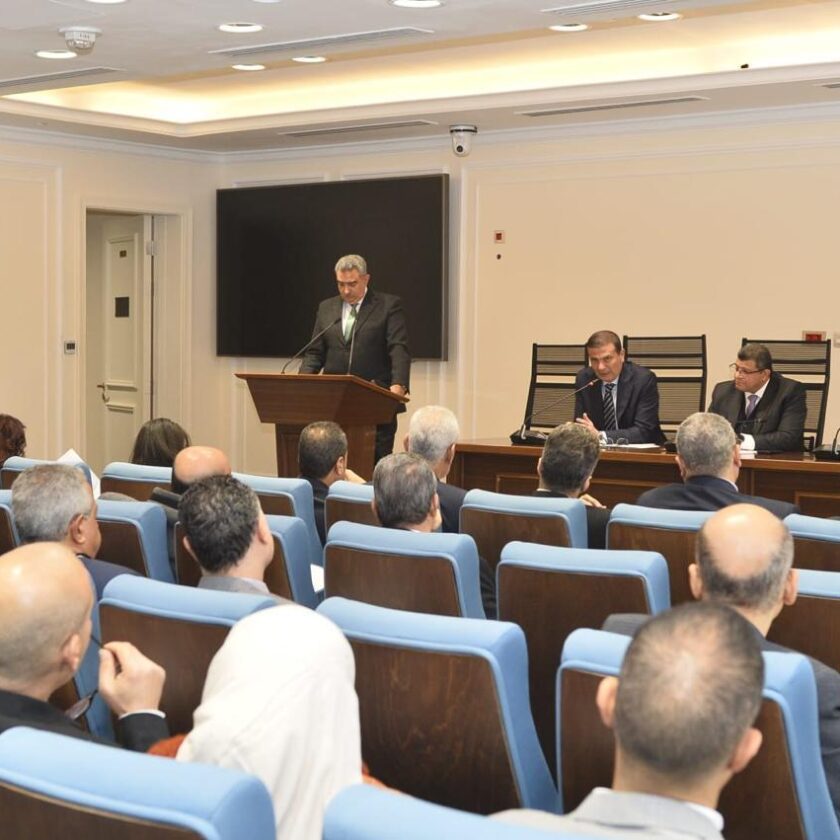شارك السيد/ حسن عبدالله محافظ البنك المركزي المصري في “الاجتماع السنوي التاسع عشر عالي المستوي حول الاستقرار المالي والأولويات التنظيمية والرقابية” بأبو ظبي، والذي استمرت فعالياته على مدار يومي 18 و19 ديسمبر 2024، بحضور السيد/ خالد محمد بالعمى محافظ مصرف الإمارات العربية المتحدة المركزي، والدكتور/ فهد بن محمد التركي المدير العام رئيس مجلس إدارة صندوق النقد العربي، والسيد/ فرناندو ريستوي رئيس معهد الاستقرار المالي، وعدد كبير من محافظي البنوك المركزية بالدول العربية.
تضمن الاجتماع العديد من الجلسات التي ناقشت عددًا من القضايا والموضوعات ذات الأولوية للبنوك المركزية والأنظمة المصرفية العربية، منها اتجاهات المخاطر في الأنظمة المالية بالدول العربية، والأولويات الرقابية في ظل التغيرات الاقتصادية والتداعيات الجيوسياسية، ودور البنوك المركزية في ضوء تزايد الاعتماد على الذكاء الاصطناعي والتطورات التكنولوجية، وتعزيز حوكمة البنوك المركزية، والمبادئ الأساسية المعدّلة للرقابة المصرفية الفعالة وانعكاساتها على الأطر الرقابية والاحترازية.
وخلال مشاركته في الجلسة الأولى من الاجتماع أوضح السيد/ حسن عبدالله محافظ البنك المركزي المصري أن تعزيز الاستقرار المالي ومرونة القطاعات المصرفية العربية يكتسب أهمية كبيرة في الوقت الراهن، لافتًا إلى أن البنوك المركزية تقوم بدور رئيسي في هذا الإطار من خلال ضمان تبني البنوك لسياسات ديناميكية ودقيقة لإدارة المخاطر واستعدادها للتكيف مع الظروف المتغيرة والصدمات المتلاحقة والمخاطر الناشئة المتعلقة بتغيرات المناخ والتحديات السيبرانية، وذلك عبر تطبيق أدوات السياسة الاحترازية الكلية، مؤكدًا على ضرورة التنسيق بين كل من السياسة المالية والسياسة النقدية لتعزيز الاستقرار الاقتصادي، واحتواء الضغوط التضخمية وتوجيه المزيد من التمويل للقطاع الخاص لدفع النمو الاقتصادي.
وأوضح المحافظ أن البنك المركزي المصري يقوم بصورة دورية بتقييم صلابة القطاع المصرفي في مواجهة المخاطر المختلفة التي قد تهدد الاستقرار المالي، وذلك من خلال منظور احترازي كلي، حيث يتم تطبيق اختبارات الضغوط الكلية ضمن سيناريو متكامل للمخاطر الاقتصادية والمالية والجيوسياسة والمناخية بهدف قياس مدى تأثر القطاع المصرفي بالمخاطر النظامية التي قد تنتج عن تلك الصدمات، وقد أظهرت هذه الاختبارات مرونة القطاع المصرفي المصري في مواجهة مختلف المخاطر، وفاعلية السياسة الاحترازية الكلية والجزئية للبنك المركزي المصري في تعزيز الاستقرار المالي.
وجدير بالذكر أن هذا الاجتماع السنوي يمثل أهمية كبيرة لصانعي السياسات ومتخذي القرار في البنوك المركزية والمؤسسات المالية والمصرفية وكبار مسؤولي الرقابة المصرفية في المنطقة العربية، باعتباره لقاءً دوريًا يضم خبرات متميزة ومسؤولين رفيعي المستوى، ويناقش أهم المستجدات في قضايا الاستقرار المالي والتشريعات الرقابية، بما يساهم في الخروج برؤى قيّمة يتم ترجمتها إلى قرارات فاعلة تعمل على تعزيز الاستقرار المالي في الدول العربية.
Central Bank of Egypt’s Governor Participates in the Annual High-level Meeting of the Arab Monetary Fund on “Financial Stability and Regulatory and Supervisory Priorities”
H.E. Mr. Hassan Abdalla, Governor of the Central Bank of Egypt (CBE), participated in the “19th High-level Meeting on Financial Stability and Regulatory and Supervisory Priorities” in Abu Dhabi, taking place over the course of December 18th and 19th, 2024. The meeting events were attended by Mr. Khaled Mohamed Balama, Governor of the Central Bank of the UAE, Dr. Fahad bin Mohammed Al-Turki, the Director General and Chairman of the AMF, and Mr. Fernando Restoy, Chair of the Financial Stability Institute (FSI) at the Bank for International Settlements (BIS), along with a number of central banks’ Governors from Arab countries.
The annual meeting encompassed several sessions discussing a number of topics and priority issues for central banks and Arab banking systems. These topics included risk developments in the financial systems of Arab countries, supervisory priorities amid economic changes and geopolitical repercussions, in addition to the role of central banks in light of the growing reliance on artificial intelligence and technological advancements, the enhancement of central banks’ governance, as well as the revised core principles for effective banking supervision and their implications on supervisory and prudential frameworks.
During his participation in the first session of the meeting, the CBE’s Governor Mr. Hassan Abdalla clarified that strengthening the financial stability and resilience of Arab banking sector is currently gaining great importance. He also highlighted the key role of central banks in that context by ensuring banks’ adoption of dynamic and meticulous risk management policies, and their readiness to adapt effectively to the changing conditions, successive shocks and emerging risks related to climate change and cybersecurity challenges. This is achieved through the application of macroprudential policy tools, emphasizing the necessity of coordinating fiscal and monetary policies to boost economic stability, contain inflationary pressures, and direct more financing to the private sector to propel economic growth.
The Governor also clarified that the CBE regularly assesses the banking sector’s resilience in the face of the various risks that may jeopardize financial stability. This assessment is carried out through a macroprudential perspective by applying macro stress tests in context of an integrated scenario incorporating economic, financial, geopolitical and climate-related risks to measure the extent of the banking sector’s vulnerability to potential systemic risks that may result from these shocks. The conducted tests have demonstrated the Egyptian banking sector’s resilience in the face of the various shocks, as well as the effectiveness of the CBE’s macroprudential and microprudential policies in supporting financial stability.
It is noteworthy that this annual meeting is of great significance to policymakers and decision-makers in central banks, financial and banking institutions, as well as senior banking supervision officials in the Arab region, being a periodic high-level forum, bringing distinguished expertise and high-level officials together to discuss the key developments in financial stability issues and regulatory legislations. The annual meeting also contributes to generating valuable insights that are translated into effective decisions aimed at enhancing financial stability in Arab countries.




